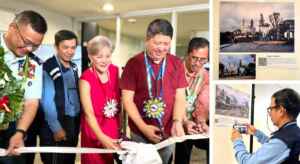ENHANCING EARLY LITERACY AND NUMERACY: ELLN RE-ECHO LAC SESSION FOR KINDER TO GRADE 3 TEACHERS
Margie S. Cambod
The Early Language, Literacy, and Numeracy (ELLN) Program is a vital initiative aimed at strengthening foundational skills among young learners. Recognizing the crucial role of early education, a Learning Action Cell (LAC) session was conducted to re-echo the key learnings
from the ELLN training, ensuring that Kinder to Grade 3 teachers are equipped with effective strategies to enhance literacy and numeracy in their classrooms. Event Details The ELLN Re-Echo LAC session was held on Saturday, March 29, 2025, at Buyagan Elementary School.
Objectives of the ELLN Re-Echo LAC Session The primary goal of the session was to reinforce teachers’ knowledge and skills in early literacy and numeracy instruction. Specific objectives included: Enhancing understanding of research-based teaching strategies for early literacy and numeracy. Providing practical approaches for implementing differentiated instruction. Strengthening assessment techniques to track student progress effectively. Encouraging collaborative learning and sharing of best practices among educators. Key Highlights of the Session During the re-echo LAC session, the primary focus was on Vocabulary Development and Fluency, ensuring that teachers could effectively support students in building strong literacy skills.
1. Vocabulary Development
Teachers explored strategies to enhance students’ word knowledge and language acquisition, including: Contextual learning – Teaching vocabulary in meaningful and relevant contexts. Explicit vocabulary instruction – Using direct teaching methods to introduce new words. Interactive activities – Engaging students in storytelling, discussions, and word games to reinforce learning.
2. Fluency Development
To improve students reading fluency, the session covered: Guided repeated reading. Encouraging students to read passages multiple times for better fluency. Echo reading and choral reading – Helping students develop confidence and rhythm in reading. Use of decodable texts and leveled readers – Providing appropriate reading materials to match students’ proficiency levels.
3. Assessment and Intervention Strategies
Teachers were trained on various assessment tools to monitor student learning, including: Diagnostic assessments to identify learning gaps. Formative assessments to provide ongoing feedback. Summative assessments to evaluate overall student progress.
4. Collaborative Learning and Best Practices Sharing The session emphasized the importance of collaboration among teachers through: Peer coaching and mentoring – Encouraging teachers to support each other in implementing ELLN strategies. LAC discussions and reflections.
Educator's Corner
ENHANCING EARLY LITERACY AND NUMERACY: ELLN RE-ECHO LAC SESSION FOR KINDER TO GRADE 3 TEACHERS
May 3, 2025
THE EFFECTS OF PARENTAL INVOLVEMENT ON STUDENT’S BEHAVIOR
March 22, 2025





